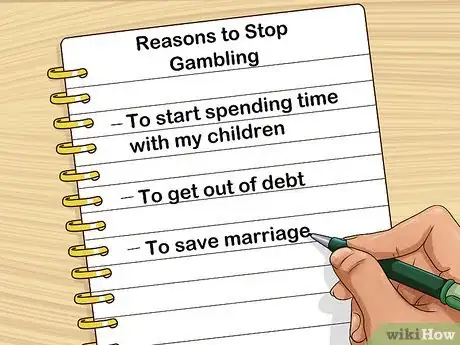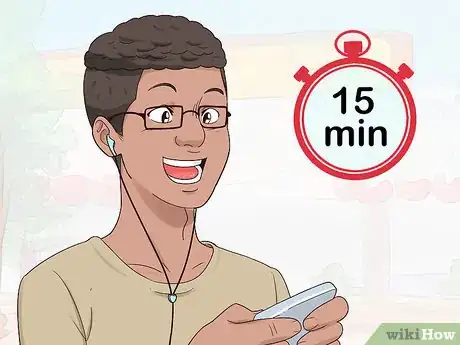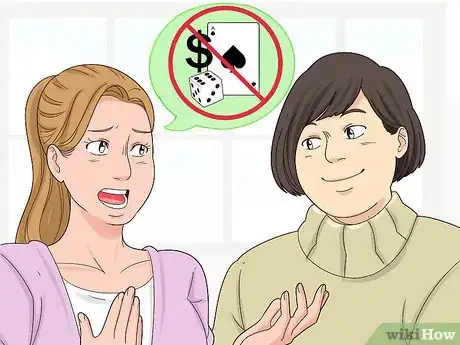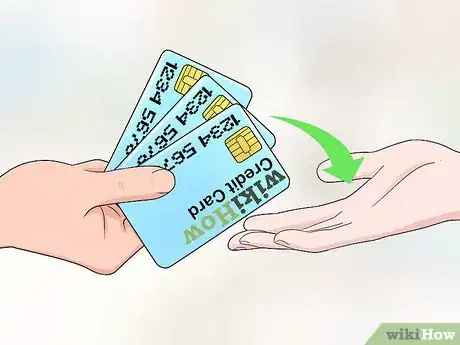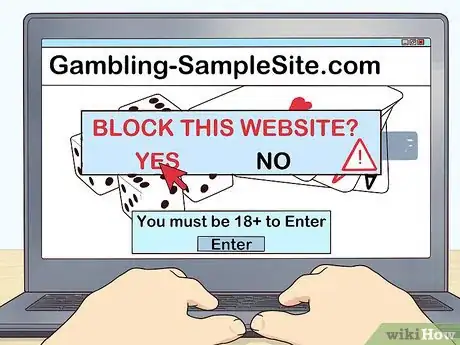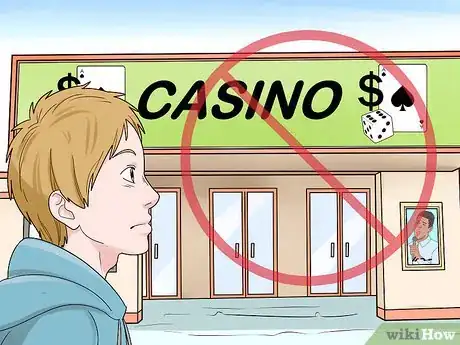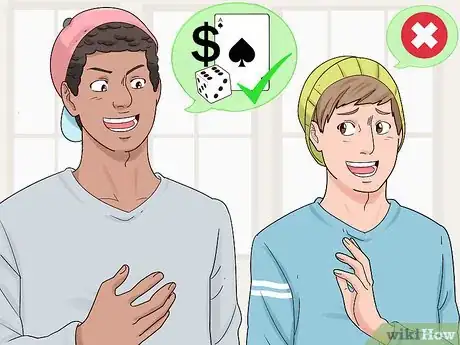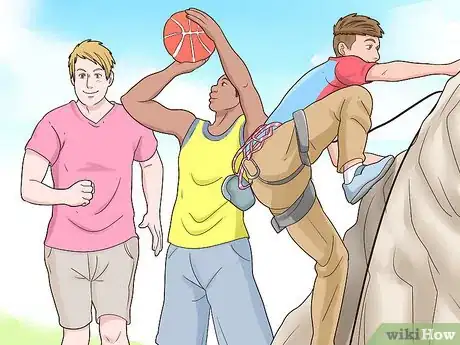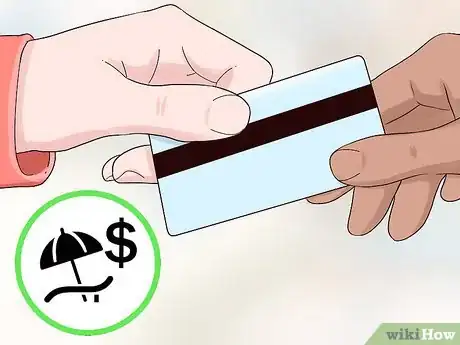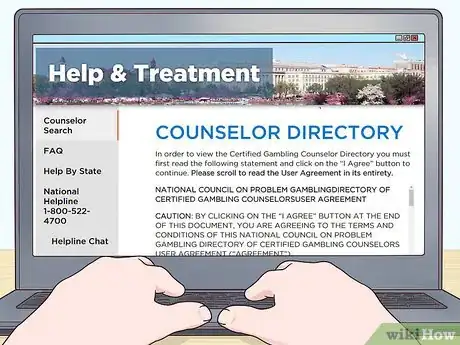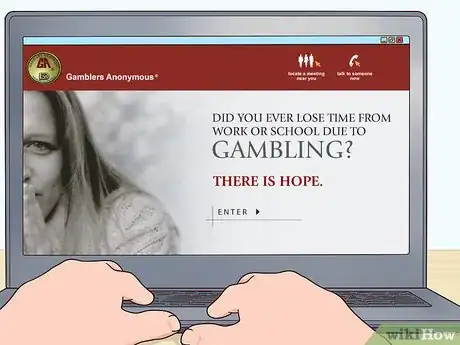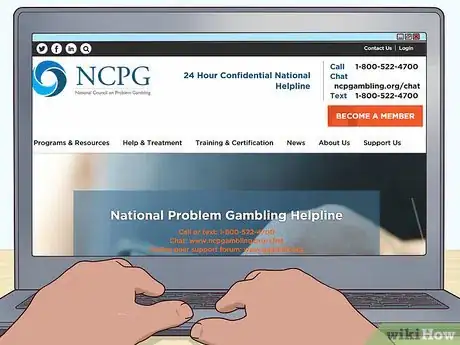This article was co-authored by Trudi Griffin, LPC, MS. Trudi Griffin is a Licensed Professional Counselor in Wisconsin specializing in Addictions and Mental Health. She provides therapy to people who struggle with addictions, mental health, and trauma in community health settings and private practice. She received her MS in Clinical Mental Health Counseling from Marquette University in 2011.
There are 9 references cited in this article, which can be found at the bottom of the page.
This article has been viewed 50,119 times.
Like any bad habit, a love of gambling can quickly get out of hand. If you’re looking to stop gambling, we’re here to help. From replacing the hobby with something more productive to resisting the urge in the moment, we’ll show you how to get over this. Keep in mind, if this bad habit has turned into something more nefarious and you believe you may be addicted, do not hesitate to get help. There are a ton of resources out there when it comes to finding support.
Steps
Fighting the Urge to Gamble
-
1List reasons why you need to stop gambling. To stop gambling requires you to reach a conclusion: that your life will be improved by quitting. Write down your reasons for wanting to stop and review them when the urge strikes. Good reasons to stop might be to free up to start spending that time with your children, to get out of debt, or to save your marriage or relationships.[1]
-
2Postpone the urge for 15 minutes. Put off your gambling for a short time whenever you get the temptation. Tell yourself you can do it after 15 minutes. In the meantime, distract yourself by playing a game on your phone or watching TV. Once your delay period ends, the urge will likely have passed.[2]
- If you still have the urge to gamble after the time elapsed, set a new 15-minute delay. Over time, you will get better at controlling your urge to gamble.
Advertisement -
3Call someone for support and accountability. Instead of giving in to the urge, reach out to a loved one. Ask this person to distract you or remind you why gambling is not a good idea. Say, "I'm trying to stop gambling. Will you help hold me accountable?"[3]
- You might designate a few people to hold you accountable. Agree on times when you can contact them for support, so you're not intruding on any one person's life too much.
- If you’d prefer not to involve your loved ones too much and you’d like alternative ideas on how to get support and hold yourself accountable, go to http://www.gamblersanonymous.org/ga/.
-
4Put someone else in charge of your money for a while. Prevent yourself from being able to gamble by letting go of your financial reins. Have a partner, parent, or close friend control your finances until you get a handle on your gambling problem.[4]
- This might involve them setting up automatic drafts to pay your bills and blocking any spending to gambling sites or establishments.
-
5Block websites or apps related to gambling. Limit your access to gambling opportunities by deleting the apps and blocking the websites you typically frequent. It may be a good idea to stay away from forums or social media groups where you can interact with other gamblers, too.[5]
- To block sites on your computer, you will need to compile a list of URLs. You must also have administrative privileges on the computer in order to add blocked sites to your local C drive block list.
-
6Steer clear of gambling establishments. Stop visiting all casinos, tracks, and any other environments that cater to gambling. If you don't trust yourself to stay away, tell the operators that you have a problem with gambling and ask them restrict your entry.[6]
- Many gambling establishments have a 1-800 number that you can call to have your name added to a restricted entry list. This will also stop you from receiving email and snail mail advertisements.
-
7Stay away from friends and family members who gamble. If you tend to gamble socially, it’ll be much easier to stop if you stop associating with those who you typically gamble with. Especially if they aren’t trying to stop, spending time with these people can quickly lead to temptation. Spend your time with friends and family members who aren’t interested in gambling to keep it off your mind as much as possible.
Adopting New Pastimes
-
1Spend free time with family and friends. If you gamble often, there's probably someone in your life feeling neglected. Use your newfound time to cultivating your relationships with family members and close friends.[7]
- During the time you would normally spend gambling, plan a date with your spouse, a movie night with your kids, or a hike with your pals.
-
2Do physical activities that give you a rush. If the exhilaration makes you gamble, find healthy behaviors that are just as exciting. Consider sports like running, playing basketball, or rock climbing. Challenge yourself with new exercise routines such as weight-lifting or high-intensity interval training.[8]
- The upside to this approach is that you will experience an endorphin rush while also supporting your health and wellness.
-
3Pick up an old hobby to cope with boredom. Did you once enjoy an activity, but stopped doing it? If so, rekindle your neglected passions to keep yourself busy during your free time. Fill your hours with constructive hobbies like gardening, painting, writing, sailing, or restoring furniture.[9]
- Use your hobbies to connect with others by joining local clubs or organizations. Doing this can help you link up with people who aren't connected to gambling, especially if many of your old friends still gamble.
- If you don’t want to get back into an old hobby, consider getting into a new one. Try something new that you’ve never tried before, as this may challenge and stimulate you.
-
4Fight stress with relaxation exercises. Your tendency to gamble may have developed from a need to escape everyday life stress. Rather than placing bets, start doing relaxation techniques like meditation, yoga, or progressive muscle relaxation.[10]
- Doing these exercises daily can help you keep stress at bay.
-
5Commit your money to a good cause. Think of creative and meaningful ways to use your money for a more important reason than gambling. Set up automatic drafts from your paycheck to ensure your extra money goes to savings or investments.[11]
- For example, you might save or invest for an exciting vacation, your retirement, or your kid's education.
Getting Professional Help
-
1See a trained addiction specialist. If you have a compulsive need to gamble and find that quitting on your own is too difficult, see a professional. Problem gambling may be classified as an addiction, so you may benefit from seeing an addiction counselor.[12]
- Locate an addiction counselor in your area by visiting the counselor directory on the National Council on Problem gambling website at: https://www.igccb.org/counselor-directory/.
- In therapy, you can change thought patterns that drive you to gamble and learn how to cope with urges.
-
2Take medication to address underlying issues. Gambling may be serving as a numbing agent for other problems, like anxiety, depression, and impulse control disorders. Certain medications may help ease symptoms and empower you to make better choices. Talk to your doctor to determine if medications are right for you.[13]
-
3Join a support group. A 12-step support group like Gamblers Anonymous can provide the accountability, structure, and encouragement you need to successfully stop gambling. Look for groups in your area and commit to attending meetings as often as you can.[14]
- Visit the Gamblers Anonymous website to find groups in your area: http://www.gamblersanonymous.org/ga/.
-
4Access resources that help you stop gambling. The National Council on Problem Gambling website is a trusted source for overcoming your gambling habit. On the site, learn about inpatient and outpatient programs dedicated to problem gambling and find treatment centers in your area.
- To learn more, go to http://www.ncpgambling.org/.
- If you need immediate assistance and are in the United States or Canada, call the NCAP helpline at 1-800-522-4700.
References
- ↑ https://www.gamblinghelponline.org.au/making-a-change/change-strategies
- ↑ https://www.gamblinghelponline.org.au/making-a-change/taking-control/tools-for-quitting
- ↑ https://www.helpguide.org/articles/addictions/gambling-addiction-and-problem-gambling.htm
- ↑ https://www.helpguide.org/articles/addictions/gambling-addiction-and-problem-gambling.htm
- ↑ https://www.moneytalksnews.com/8-signs-youre-addicted-to-gambling-and-5-tips-to-stop/
- ↑ https://www.moneytalksnews.com/8-signs-youre-addicted-to-gambling-and-5-tips-to-stop/
- ↑ http://knowtheodds.org/blog/healthy-activities-gambling-addiction-recovery/
- ↑ https://www.helpguide.org/articles/addictions/gambling-addiction-and-problem-gambling.htm
- ↑ http://www.counselling-directory.org.uk/counsellor-articles/the-10-most-successful-ways-of-overcoming-gambling-urges
- ↑ https://www.helpguide.org/articles/addictions/gambling-addiction-and-problem-gambling.htm
- ↑ https://www.moneyunder30.com/how-to-invest
- ↑ https://www.mayoclinic.org/diseases-conditions/compulsive-gambling/diagnosis-treatment/drc-20355184
- ↑ https://www.scientificamerican.com/article/how-the-brain-gets-addicted-to-gambling/
- ↑ https://www.mayoclinic.org/diseases-conditions/compulsive-gambling/diagnosis-treatment/drc-20355184
About This Article
To stop gambling, try picking up new hobbies, like gardening, painting, or playing sports, so you have less free time to worry about gambling. Alternatively, if you gamble as a way to escape the stress in your life, consider doing daily relaxation exercises, like meditation, yoga, or progressive muscle relaxation. Also, while resisting the urge to gamble isn't easy, there are things you can do to help, like blocking gambling apps and websites and distancing yourself from friends or family members that gamble. For more advice from our Counselor co-author, like how to seek professional help for a gambling addiction, scroll down.
